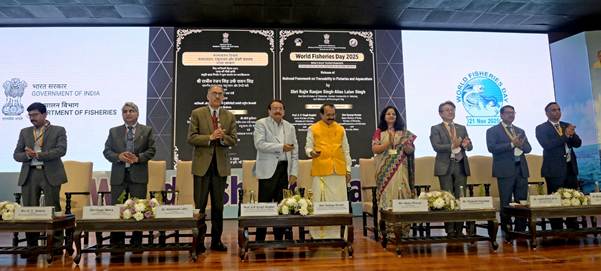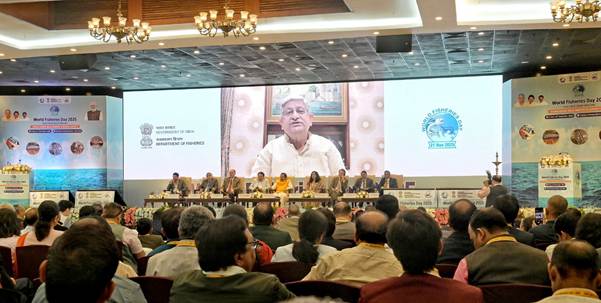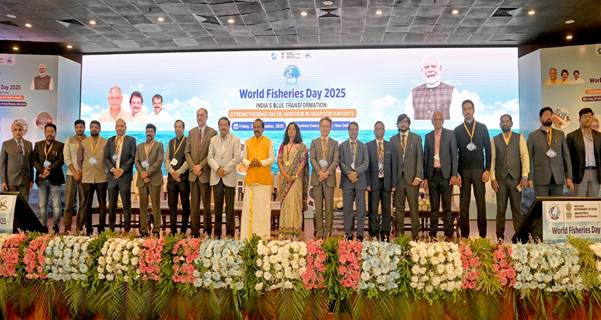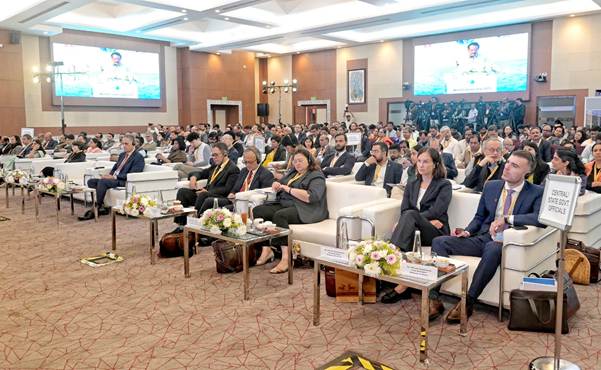Ministry of Fisheries, Animal Husbandry & Dairying
India Unveils “National Framework on Traceability in Fisheries and Aquaculture 2025” as the Sector Marks a Major Leap on World Fisheries Day
“Coordinated Efforts and FTAs Key to Expanding India’s Seafood Exports”: Shri Rajiv Ranjan Singh
India Targets ₹1 Lakh Crore in Seafood Exports by 2030
Global Stakeholders Join Discussions to Boost India’s Fisheries Exports and PMMSY Phase 2 Strategy
Posted On:
21 NOV 2025 5:55PM by PIB Delhi
The Department of Fisheries under the Ministry of Fisheries, Animal Husbandry & Dairying, celebrated World Fisheries Day 2025 in New Delhi today under the theme “India’s Blue Transformation: Strengthening Value Addition in Seafood Exports.” On this occasion Union Minister Shri Rajiv Ranjan Singh alias Lalan Singh addressed the participants via a video message. Ministers of State, Ministry of Fisheries, Animal Husbandry & Dairying Prof. S. P. Singh Baghel and Shri George Kurian graced the event in New Delhi.
Marking a major milestone for India’s fisheries and aquaculture sector, the Department released the National Framework on Traceability in Fisheries and Aquaculture 2025 and unveiled several key initiatives including the SOP for Mariculture, SOP on Development and Management of Smart and Integrated Fishing Harbours, SOP on Development of Minimum Basic Infrastructure at Notified Marine Fish Landing Centres, Guidelines for Reservoir Fisheries Management and the Compendium of Coastal Aquaculture Guidelines. These interventions collectively aim to modernize fisheries infrastructure, strengthen sustainability practices and accelerate value addition across the sector.


Union Minister Shri Rajiv Ranjan Singh, in his recorded video message, reaffirmed India’s commitment to driving innovation and building global partnerships to enhance export competitiveness. He called on stakeholders to adopt a coordinated approach to strengthen the seafood value chain by improving packaging, meeting certification standards, and leveraging Free Trade Agreements to access new markets. The Union Minister highlighted the importance of strengthening traceability, branding, and biosecurity to align with global benchmarks. He described the launch of the National Traceability Framework as a transformative milestone that will bolster seafood exports and help secure better returns for fishers.
Shri George Kurian highlighted India’s achievement of doubling fish production from 96 lakh tonnes to 195 lakh tonnes over the past decade, enabled by a historic investment of ₹38,572 crores under flagship schemes like PMMSY etc. Outlining the future vision, he emphasized India’s ambition to scale seafood exports to ₹1 lakh crores by 2030, with 30% comprising high-value, value-added products. Prof. S.P. Singh Baghel, in his address, underscored the vital contribution of the fisheries sector in driving exports and supporting more than 3 crore livelihoods across the country. He also emphasized that the substantial rise in the number of registered exporters has further strengthened India’s global presence in the sector and accelerated export growth. Prof. Baghel also noted that recent government initiatives such as GST reforms, digitization and focus on training have strengthened the sector by improving ease of doing business.
Dr. Abhilaksh Likhi, Secretary, Department of Fisheries, noted that India’s fisheries sector is expanding at an annual rate of 9% with seafood exports reaching 16.85 lakh tonnes in FY 2024–25 - an 88% increase over the past decade. He emphasized upon the government’s focus on value addition, diversification and regulatory compliance to establish India as a leading global seafood processing hub. Dr. Likhi also highlighted key sustainability efforts, including the Marine Mammal Stock Assessment Project and the adoption of Turtle Excluder Devices (TEDs), aimed at meeting international ecological standards.
Mr. Takayuki Hagiwara, FAO India Representative, in his address reaffirmed FAO’s commitment to supporting India in advancing food security, sustainability and resilience in fisheries and aquaculture. Highlighting the Blue Port Initiative, Mr. Hagiwara noted its vision to modernize fisheries infrastructure and attract private investment, thereby strengthening global competitiveness. He also underscored the urgent need to tackle Antimicrobial Resistance (AMR), stressing that reducing drug use in seafood value chain processing is critical, and affirmed that FAO is working closely with the Government of India to address this challenge.


The event saw strong global participation, including representatives from 19 embassies and international organizations such as the World Bank, FAO, AFD, GIZ, JICA, BoBP and MSC, reflecting deepening international collaboration in fisheries and aquaculture. This engagement builds on recent diplomatic meeting, including meetings with the Embassies of Thailand, Indonesia, Japan, and Australia, to strengthen bilateral cooperation in the sector and fuel export promotion.
The two technical sessions on Enhancing Growth through Value Addition in Fisheries and Aquaculture and Harnessing Export Potential of Inland States/UTs of India with Focus on Freshwater Fish Species focused on accelerating seafood export growth through value addition, innovation, branding, compliance with quality standards, and smart infrastructure, as well as expanding export opportunities for freshwater fish species through market diversification and digital traceability. Inputs from these deliberations will play a key role in shaping PMMSY Phase 2.
About National Framework on Traceability in Fisheries and Aquaculture 2025
National Framework on Traceability in Fisheries and Aquaculture 2025, developed under PM-MKSSY aims to establish a national digital traceability system that enhances food safety, sustainability, and global market access. The framework outlines a comprehensive strategy to unify fragmented traceability practices by integrating digital tools such as blockchain, IoT, QR codes and GPS, while ensuring inclusivity for small-scale fishers and farmers. The framework will enable real-time, end-to-end tracking of Seafood products from ‘farm to plate’ and ‘catch to consumer.’ (Brief on National Traceability Framework)
National Framework on Traceability in Fisheries and Aquaculture 2025
SOP for Mariculture
SOP on Development and Management of Smart and Integrated Fishing Harbours
SOP on Development of Minimum Basic Infrastructure at Notified Marine Fish Landing Centres
Guidelines for Reservoir Fisheries Management
Compendium of Coastal Aquaculture Guidelines
***
Aditi Agrawal
(Release ID: 2192602)
Visitor Counter : 1877